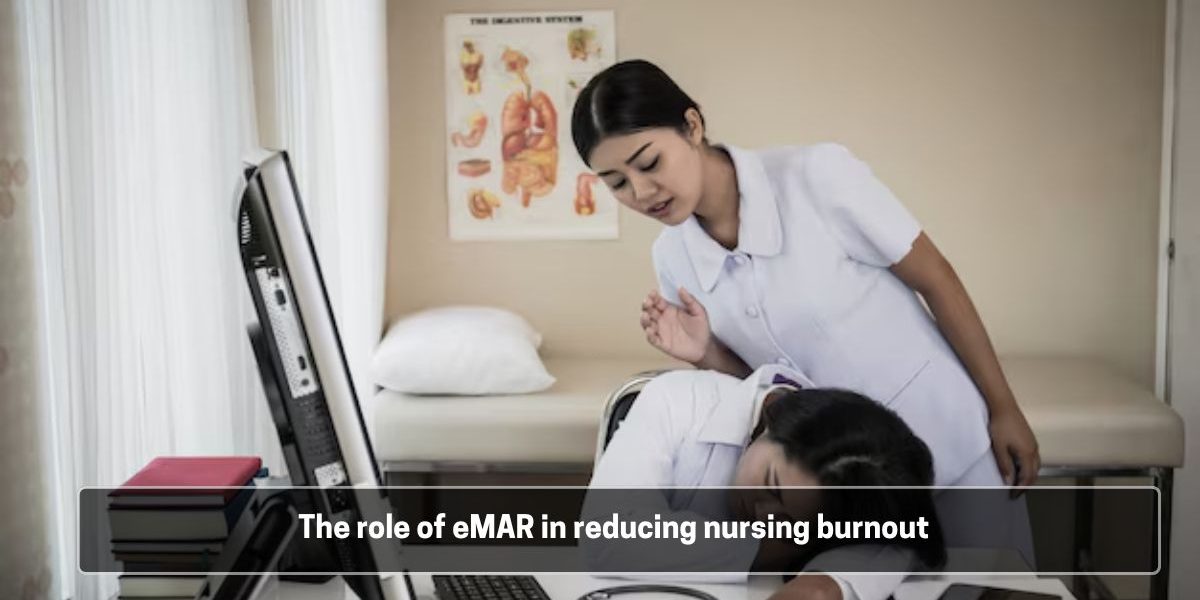Nursing burnout is a growing concern in healthcare, particularly in the UK, where nurses are often stretched thin due to staff shortages, long hours, and the complex needs of patients. Burnout can severely impact patient care quality, job satisfaction, and overall well-being. Electronic medication administration records (eMARs) have emerged as a valuable tool to help prevent nursing burnout by streamlining medication administration processes and reducing the administrative burdens:
What is nursing burnout?
Nursing burnout can result from several factors, including:
- High patient acuity and workload: Managing multiple complex cases simultaneously can overwhelm nurses, leading to stress and fatigue.
- Emotional strain: Dealing with patients’ pain, suffering, and sometimes death can take an emotional toll over time.
- Administrative burden: Excessive paperwork and documentation can divert time away from patient care, leading to frustration and dissatisfaction.
- Lack of support: Insufficient resources and support from management can exacerbate feelings of helplessness and stress.
These stressors can have serious implications not only for nurses’ mental health but also for the quality of care they provide.
How eMAR helps nurses stay focused and prevent burnout?
eMAR systems are designed to streamline and simplify the medication administration process. By automating and optimising various tasks, eMARs enable nurses to focus more on direct patient care and less on administrative duties, thereby helping to prevent burnout.
Managing different types of nursing stress with eMAR
1. Administrative stress:
Documentation overload:
Traditional medication administration involves extensive manual documentation, which can be time-consuming and error-prone. eMARs automate the recording of medication administration, eliminating the need for repetitive manual charting. This not only saves time but also reduces the risk of documentation errors, allowing nurses to focus on patient care rather than paperwork.
Streamlined processes:
With eMARs, nurses no longer need to handle physical charts or search for patient records. All relevant information is accessible electronically in one centralised system. This ease of access reduces the time spent searching for information and simplifies the overall workflow, decreasing administrative stress.
2. Clinical stress:
Medication errors:
One of the most significant sources of clinical stress for nurses is the fear of making a medication error, which can have serious consequences for patient safety. eMAR systems include built-in safety features such as automatic dosage calculations, alerts for potential drug interactions, and verification of patient identity through barcode scanning. These features help minimise errors and give nurses confidence in their practice, thereby reducing stress.
Complex medication regimens:
Managing intricate medication schedules for patients with multiple comorbidities can be overwhelming. eMAR systems simplify this process by providing clear, real-time schedules and reminders, ensuring that nurses administer the correct medications at the right times. This reduces the mental burden associated with keeping track of complex regimens.
3. Emotional stress:
Emotional toll of caregiving:
Nurses often experience emotional stress from caring for patients who are critically ill or facing end-of-life issues. eMAR systems help alleviate some of this burden by reducing the time spent on administrative tasks, giving nurses more opportunities to engage in meaningful patient interactions and provide emotional support.
Work-life balance:
Excessive workload and overtime are significant contributors to burnout. By improving efficiency and reducing the need for overtime due to backlogged administrative work, eMARs help nurses maintain a better work-life balance. This can mitigate the emotional stress of feeling perpetually overworked and unable to disconnect from the job.
4. Interpersonal stress:
Team communication:
Breakdowns in communication between healthcare team members can lead to misunderstandings, increased workload, and stress. eMARs facilitate real-time updates on medication administration and patient status, enabling better coordination among healthcare providers. This reduces the likelihood of communication failures and the stress that arises from them.
Patient communication:
Clear and accessible medication records enable nurses to provide more accurate and timely information to patients and their families. This transparency helps build trust and reduces the stress associated with managing patient and family expectations.
eMAR systems not only improve the quality of care provided to patients but also enhance job satisfaction and retention rates among nursing staff.







